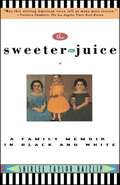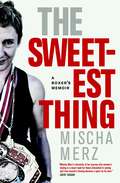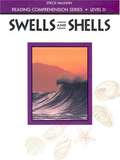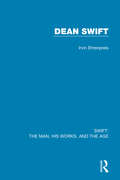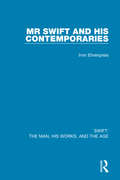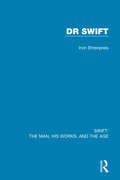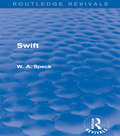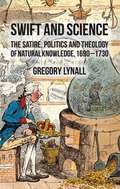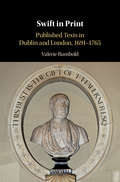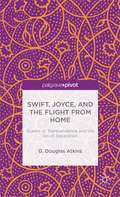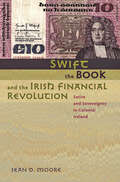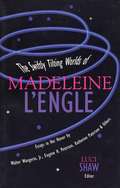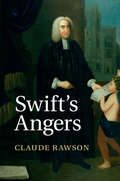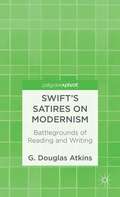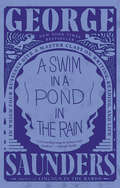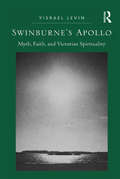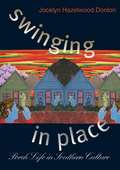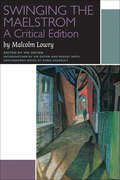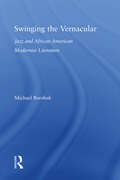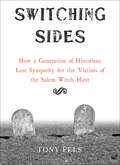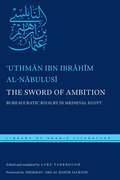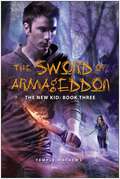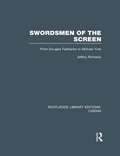- Table View
- List View
The Sweeter the Juice: A Family Memoir in Black and White, First Edition
by Shirlee Taylor HaizlipThe Sweeter the Juice is a memoir, a social history, a biography, and an autobiography. Haizlip gives to us the quintessential American story, unveiling truths about race, about our society, and about the ways in which we all perceive and judge one another.
The Sweetest Thing: A Boxer's Memoir
by Mischa MerzJournalist and amateur boxer Mischa Merz fulfills a long-held ambition to travel across the United States and compete in a series of amateur boxing tournaments. On this wild and fascinating journey she meets her idols, including Lucia Rijker of Million Dollar Baby fame, and some other truly extraordinary characters. Merz discovers the horrors and delights of the world of women's boxing and gains insights into this eccentric subculture's place in American life. She also meets some of the pioneers and trailblazers of the contemporary rise in women's boxing as well as some of the younger stars now hoping to make it onto the first women's boxing team in the 2012 Olympic Games.Written in a compelling and highly entertaining narrative style, Mischa Merz takes us right into the ring and reports, with a rare insider's view, on a sport that has for centuries defined our ideas about masculinity.
Swells and Shells: Reading Comprehension Level D
by Steck-Vaughn StaffRead an exciting story while learning more about good reading comprehension.
Swift: Volume Three: Dean Swift (Swift: The Man, his Works, and the Age)
by Irvin EhrenpreisFirst published in 1983, Dean Swift is the concluding book in a series of three volumes providing a detailed exploration of the events of Swift’s life. The third volume follows Swift’s life and career from 1714 to 1745 and sets it against the public events of the age, paying close attention to political and economic change, ecclesiastical problems, social issues, and literary history. It traces Swift’s rise to becoming first citizen of Ireland and looks in detail at the composition, publication, and reception of Gulliver’s Travels, as well as many of Swift’s other works, both poetry and prose. It also explores Swift’s later years, his love affairs with Esther Johnson and Esther Vanhomrigh, his complicated friendships with Pope, Lord Bolingbroke, and Archbishop King, and his declining health. Dean Swift is a hugely detailed insight into Swift’s life from 1714 until his death and will be of interest to anyone wanting to find out more about his life and works.
Swift: Volume One: Mr Swift and his Contemporaries (Swift: The Man, his Works, and the Age)
by Irvin EhrenpreisFirst published in 1962, Mr Swift and his Contemporaries, is the first of three volumes providing a detailed exploration of the events of Swift’s life. This volume is a thorough insight into the historical and social setting of Swift’s life, the evolution of his character, and the composition and interpretation of his works. It includes a wealth of material concerning Swift’s family and career, his emotional and sexual life, his relationship with Sir William Temple, and the design and meaning of both A Tale of a Tub and The Battle of the Books. Mr Swift and his Contemporaries is ideal for anyone with an interest in Swift’s life, work, and the period in which he lived.
Swift: Volume Two: Dr Swift (Swift: The Man, his Works, and the Age)
by Irvin EhrenpreisFirst published in 1967, Dr Swift is the second of three volumes providing a detailed exploration of the events of Swift’s life. This volume begins by assessing Swift’s character, hopes and ambitions in 1699. It then traces his life and career up to 1714 in minute detail, giving close consideration to Swift’s expectations and the extent to which he felt they were fulfilled. In doing so, it covers Swift’s movement between Ireland and England, his reputation as a poet, his historical writing, his church preferments, involvement in politics, and much more, including his relationships with a number of prominent social figures of the time. Dr Swift is ideal for those with an interest in Swift’s life, and in particular his life and career between 1699 and 1714.
Swift (Routledge Revivals)
by W. A. SpeckFirst published in 1969, this title examines the works of Jonathan Swift from both a literary and an historical perspective. W. A. Speck first presents Swift in his historical context, analysing in particular the interplay between his religious and political views. Light is thrown on the early pamphlets as well as on A Tale of a Tub and Gulliver’s Travels, alongside a fascinating chapter by Philip Roberts considering Swift’s poetry. This illuminating title will be of value to any literature students with an interest in the writings of Swift and the historical context in which he worked.
Swift and History
by Ashley MarshallSwift has been said to have little interest in history; his attempts to write it have been disparaged and his desire to become Historiographer Royal ridiculed. Ashley Marshall argues that history mattered enormously to Swift. He read a vast amount of history and uses historical examples copiously in his own works. This study traces Swift's classical and modern historiographical inheritance; analyses his unsuccessful attempt to write a history of England; and offers radical re-reading of his History of the Four Last Years of the Queen. A systematic analysis of Swift's view of 'authority' is highly revealing. His attitudes toward power and authority, sovereigns' and subjects' rights, parliamentary representation, and succession are reflected in his lifelong engagement with and pervasive use of the past. Studying Swift and history enables a deeper understanding of his authoritarian and historiographically Tory outlook - and how it changed when Swift's party fell from power in 1714.
Swift and Others
by Claude RawsonJonathan Swift's influence on the writings and politics of England and Ireland was reinforced by a combination of contradictory forces: an authoritarian attachment to tradition and rule, and a vivid responsiveness to the disorders of a modernity he resisted and yet helped to create. He was, perhaps even more than Pope, a dominant voice of his times. The rich variety of the literary culture to which he belonged shows the penetration of his ideas, personality and style. This is true of writers who were his friends and admirers (Pope), of adversaries (Mandeville, Johnson), of several who became great ironists in his shadow (Gibbon, Austen), and of some surprising examples of Swiftian afterlife (Chatterton). Claude Rawson, leading scholar of the works of Swift, brings together recent essays, as well as classic earlier work extensively revised, to offer fresh insights into an era when Swift's voice was a pervasive presence.
Swift and Science
by Gregory LynallIt is thought that Swift was opposed to the new science that heralded the beginning of the modern age, but this book interrogates that assumption, tracing the theological, political, and socio-cultural resonances of scientific knowledge in the early eighteenth century, and considering what they can reveal about Swift's imagination.
Swift in Print: Published Texts in Dublin and London, 1691-1765
by Valerie RumboldPresenting a fresh perspective on one of the most celebrated print canons in literary history, Valerie Rumbold explores the expressive force of print context, format, typography, ornament and paratext encountered by early readers of Jonathan Swift. By focusing on the books, pamphlets and single sheets in which the Dublin and London book trades published his work, this revealing whole-career analysis, based on a chronology of publication that often lagged years behind dates of composition, examines first editions and significant reprints throughout Swift's lifetime, and posthumous first editions and collections in the twenty years after his death. Drawing on this material evidence, Rumbold reframes Swift's publishing career as a late expression of an early modern formation in which publishing was primarily an adjunct to public service. In an age of digital reading, this timely study invites a new engagement with the printed texts of Swift.
Swift, Joyce, and the Flight from Home: Quests of Transcendence and the Sin of Separation
by G. Douglas AtkinsIn a fresh reading of Gulliver's Travels and A Portrait of the Artist as a Young Man, Atkins draws parallels between the protagonists: both Lemuel Gulliver and Stephen Dedalus flee from the burdens of life, seeking a transcendent existence. The study sheds important new light on both novels as essential critiques of modern misunderstandings.
Swift, the Book, and the Irish Financial Revolution: Satire and Sovereignty in Colonial Ireland
by Sean D. MooreWinner, 2010 Donald Murphy Prize for a Distinguished First Book, American Conference on Irish StudiesRenowned as one of the most brilliant satirists ever, Jonathan Swift has long fascinated Hibernophiles beyond the shores of the Emerald Isle. Sean Moore's examination of Swift's writings and the economics behind the distribution of his work elucidates the humorist's crucial role in developing a renewed sense of nationalism among the Irish during the eighteenth century.Taking Swift's Irish satires, such as A Modest Proposal and the Drapier's Letters, as examples of anticolonial discourse, Moore unpacks the author's carefully considered published words and his deliberate drive to liberate the Dublin publishing industry from England's shadow to argue that the writer was doing nothing less than creating a national print media. He points to the actions of Anglo-Irish colonial subjects at the outset of Britain's financial revolution; inspired by Swift's dream of a sovereign Ireland, these men and women harnessed the printing press to disseminate ideas of cultural autonomy and defend the country's economic rights. Doing so, Moore contends, imbued the island with a sense of Irishness that led to a feeling of independence from England and ultimately gave the Irish a surprising degree of financial autonomy. Applying postcolonial, new economic, and book history approaches to eighteenth-century studies, Swift, the Book, and the Irish Financial Revolution effectively links the era's critiques of empire to the financial and legal motives for decolonization. Scholars of colonialism, postcolonialism, Irish studies, Atlantic studies, Swift, and the history of the book will find Moore's eye-opening arguments original and compelling.
The Swiftly Tilting Worlds of Madeleine L'Engle
by Luci ShawIn honor of Madeleine L'Engle's 80th birthday, a host of prominent writers and academics gather to create this unique collection. Madeleine's circle of friends and peers (writers, poets, scholars, theologians) here provide an intimate portrait of L'Engle and respond to her writings and mentoring influence.Ranging from the personal to the academic, these essays illuminate the many worlds of Madeleine's writings: the private, the reflective, the theological, the scientific, the mythic, and the literary.From the Trade Paperback edition.
Swift's Angers
by Claude RawsonJonathan Swift's angers were all too real, though Swift was temperamentally equivocal about their display. Even in his most brilliant satire, A Tale of a Tub, the aggressive vitality of the narrative is designed, for all the intensity of its sting, never to lose its cool. Yet Swift's angers are partly self-implicating, since his own temperament was close to the things he attacked, and behind his angers are deep self-divisions. Though he regarded himself as 'English' and despised the Irish 'natives' over whom the English ruled, Swift became the hero of an Irish independence he would not have desired. In this magisterial account, Claude Rawson, widely considered the leading Swift scholar of our time, brings together recent work, as well as classic earlier discussions extensively revised, offering fresh insights into Swift's bleak view of human nature, his brilliant wit, and the indignations and self-divisions of his writings and political activism.
Swift’s Satires on Modernism: Battlegrounds of Reading and Writing
by G. Douglas AtkinsMore than three centuries later, Jonathan Swift's writing remains striking and relevant. In this engaging study, Atkins brings forty-plus years of critical experience to bear on some of the greatest satires ever written, revealing new contexts for understanding post-Reformation reading practices and the development of the modern personal essay.
A Swim in a Pond in the Rain: In Which Four Russians Give a Master Class on Writing, Reading, and Life
by George SaundersFrom the New York Times bestselling, Booker Prize–winning author of Lincoln in the Bardo and Tenth of December comes a literary master class on what makes great stories work and what they can tell us about ourselves—and our world today.For the last twenty years, George Saunders has been teaching a class on the Russian short story to his MFA students at Syracuse University. In A Swim in a Pond in the Rain, he shares a version of that class with us, offering some of what he and his students have discovered together over the years. Paired with iconic short stories by Chekhov, Turgenev, Tolstoy, and Gogol, the seven essays in this book are intended for anyone interested in how fiction works and why it&’s more relevant than ever in these turbulent times.In his introduction, Saunders writes, &“We&’re going to enter seven fastidiously constructed scale models of the world, made for a specific purpose that our time maybe doesn&’t fully endorse but that these writers accepted implicitly as the aim of art—namely, to ask the big questions, questions like, How are we supposed to be living down here? What were we put here to accomplish? What should we value? What is truth, anyway, and how might we recognize it?&” He approaches the stories technically yet accessibly, and through them explains how narrative functions; why we stay immersed in a story and why we resist it; and the bedrock virtues a writer must foster. The process of writing, Saunders reminds us, is a technical craft, but also a way of training oneself to see the world with new openness and curiosity.A Swim in a Pond in the Rain is a deep exploration not just of how great writing works but of how the mind itself works while reading, and of how the reading and writing of stories make genuine connection possible.
Swinburne's Apollo: Myth, Faith, and Victorian Spirituality
by Yisrael LevinFocusing on Algernon Charles Swinburne's poems on Apollo, Yisrael Levin calls for a re-examination of the poet's place in Victorian studies in light of his contributions to nineteenth-century intellectual history. Swinburne's Apollonian poetry, Levin argues, shows the poet's active participation in late-Victorian debates about the nature and function of faith in an age of changing religious attitudes. Levin traces the shifts that took place in Swinburne's conception of Apollo over a period of four decades, from Swinburne's attempt to define Apollo as an alternative to the Judeo-Christian deity to Swinburne's formation of a theological system revolving around Apollo and finally to the ways in which Swinburne's view of Apollo led to his agnostic view of spirituality. Even though Swinburne had lost his faith and rejected institutional religion by his early twenties, he retained a distinct interest in spiritual issues and paid careful attention to developments in religious thought. Levin persuasively shows that Swinburne was not simply a poet provocateur who enjoyed controversy but failed to provide valid cultural commentary, but was rather a profound thinker whose insights into nineteenth-century spirituality are expressed throughout his Apollonian poetry.
Swinging in Place
by Jocelyn Hazelwood DonlonThe front porch evokes cherished memories from across a lifetime for many southerners--recollections of childhood games, courtship, family visits, gossip with neighbors. In this book, Jocelyn Hazelwood Donlon offers an original appreciation of the significance of the porch to everyday life in the South. The porch, she reveals, is not a simple place after all, but a stage for many social dramas. She uses literature, folklore, oral histories, and photographs to show how southerners have used the porch to negotiate public and private boundaries--in ways so embedded in custom that they often go unrecognized. Her sources include writings by Dorothy Allison, William Faulkner, Ernest Gaines, Gloria Naylor, Zora Neale Hurston, and Lee Smith, as well as oral histories that provide varying racial, gender, class, and regional perspectives. Originally derived from a number of ethnic traditions, the porch evolved in America into something both structurally and culturally unique. In this, the first serious study of the subject, Donlon shows how porch use and porch culture cross ethnic and cultural lines and discusses the transitional quality of the porch space--how it shifts back and forth, by need and function, between a place that is sometimes interior to the house, sometimes exterior.
Swinging the Maelstrom: A Critical Edition (Canadian Literature Collection)
by Malcolm LowrySwinging the Maelstrom is the story of a musician enduring existence in the Bellevue psychiatric hospital in New York. Written during his happiest and most fruitful years, this novella reveals the deep healing influence that the idyllic retreat at Dollarton had on Lowry. This long-overdue scholarly edition will allow scholars to engage in a genetic study of the text and reconstruct, step by step, the creative process that developed from a rather pessimistic and misanthropic vision of the world as a madhouse (The Last Address, 1936), via the apocalyptic metaphors of a world on the brink of Armageddon (The Last Address, 1939), to a world that, in spite of all its troubles, leaves room for self-irony and humanistic concern (Swinging the Maelstrom,1942–1944). - This book is published in English.
Swinging the Vernacular: Jazz and African American Modernist Literature
by Michael BorshukThis book looks at the influence of jazz on the development of African American modernist literature over the 20th century, with a particular attention to the social and aesthetic significance of stylistic changes in the music.
Switching Sides: How a Generation of Historians Lost Sympathy for the Victims of the Salem Witch Hunt
by Tony FelsTony Fels traces a remarkable shift in scholarly interpretations of the Salem witch hunt from the post-World War II era up through the present. In Switching Sides, Tony Fels explains that for a new generation of historians influenced by the radicalism of the New Left in the 1960s and early 1970s, the Salem panic acquired a startlingly different meaning. Determined to champion the common people of colonial New England, dismissive toward liberal values, and no longer instinctively wary of utopian belief systems, the leading works on the subject to emerge from 1969 through the early 2000s highlighted economic changes, social tensions, racial conflicts, and political developments that served to unsettle the accusers in the witchcraft proceedings. These interpretations, still dominant in the academic world, encourage readers to sympathize with the perpetrators of the witch hunt, while at the same time showing indifference or even hostility toward the accused.Switching Sides is meticulously documented, but its comparatively short text aims broadly at an educated American public, for whom the Salem witch hunt has long occupied an iconic place in the nation’s conscience. Readers will come away from the book with a sound knowledge of what is currently known about the Salem witch hunt—and pondering the relationship between works of history and the ideological influences on the historians who write them.“With vivacious prose, palpable passion, and powerful reasoning, he delivers a book that is dramatic and dynamic. A rare work of critical historiography that could actually matter, Switching Sides is a brilliant and impassioned volume that will be a must-read for all students of early America.” —Michael W. Zuckerman, author of Peaceable Kingdoms
The Sword of Ambition: Bureaucratic Rivalry in Medieval Egypt (Library of Arabic Literature #38)
by ʿUthmān ibn al-NābulusīThe Sword of Ambition belongs to a genre of religious polemic written for the rulers of Egypt and Syria between the twelfth and the fourteenth centuries. Unlike most medieval Muslim polemic, the concerns of this genre were more social and political than theological. Leaving no rhetorical stone unturned, the book’s author, an unemployed Egyptian scholar and former bureaucrat named 'Uthman ibn Ibrahim al-Nabulusi (d. 660/1262), poured his deep knowledge of history, law, and literature into the work. Now edited in full and translated for the first time, The Sword of Ambition opens a new window onto the fascinating culture of elite rivalry in the late-medieval Islamic Middle East. It contains a wealth of little-known historical anecdotes, unusual religious opinions, obscure and witty poetry, and humorous cultural satire. Above all, it reveals that much of the inter-communal animosity of the era was conditioned by fierce competition for scarce resources that were increasingly mediated by an ideologically committed Sunni Muslim state. This insight reminds us that seemingly timeless and inevitable “religious” conflict must be considered in its broader historical perspective.The Sword of Ambition is both the earliest and most eclectic of several independent works composed in medieval Egypt against the employment of Coptic and Jewish officials, and is vivid testimony to the gradual integration of Islamic scholarship and state administration that was well underway in its day.A bilingual Arabic-English edition.
The Sword of Armageddon
by Temple MathewsThings have never been darker for 16-year-old Will Hunter. The girl he loves has been taken from him, he's been betrayed by his newfound half-sister, and he has only hours to find a cure to the poison coursing through his veins. He's in no shape to stop the Dark Lord from finding and using the Sword of Armageddon—but if he can't, he's not the only one who will die. The third book in the New Kid series takes Will and friends from a demon-infested island in the Puget Sound to the top of the Seattle Space Needle, where Will's struggle against the Dark Lord ends in a confrontation that will determine the fate of all mankind.
Swordsmen of the Screen: From Douglas Fairbanks to Michael York (Routledge Library Editions: Cinema)
by Jeffrey RichardsThis fascinating study of the genre of swashbuckling films received wide critical acclaim when it was first published in 1977. Jeffrey Richards assesses the contributions to the genre of directors, designers and fencing masters, as well as of the stars themselves, and devotes several chapters to the principal subjects if the swashbucklers – pirates, highwaymen, cavaliers and knights. The result is to recall, however fleetingly, the golden days of the silver screen. Reviews of the original edition: ‘An intelligent, scholarly, well-written account of adventure films, this work is sensitive both to cinema history and to the literary origins of the "swashbuckler"….Essential for any library with books on film, it may very well be the definitive book on its subject.’ – Library Journal
